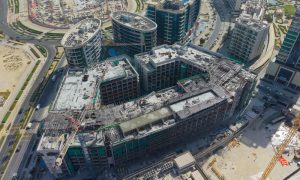Raise Your Standards
Nigel Davies, director of Operations for the MENA region, Macro, breaks down the regional MEP industry for Big Project ME

In December 2013, Macro, the property and facilities management company, appointed Nigel Davies as director of Operations for the Middle East and North Africa region.
With more than 30 years of experience in contracting, engineering and operations, he has been tasked with developing Macro’s integrated facilities management business in the region, as well as the technical services business, which provides mechanical, electrical and plumbing (MEP) services to a wide range of clients in the public and private sector.
Obviously a man with a busy schedule, he sat down for a quick chat to discuss the various issues facing the GCC’s MEP industry.
BPME: Hi Nigel, could you outline what you see as some of the major issues facing the MEP industry today?
Nigel Davies: I think that the issue that has always been there is that the market is driven by price. Although it’s recovering now, there’s a lot of price pressure in the market. Consequently, what I’m seeing more and more of is that civil contractors are taking jobs at what is literally cost.
The way the industry traditionally works is that there is the main civil contractor – with MEP part of the subcontractor portfolio. (As such) they’re literally squeezing the subcontractor during the period of the contract, so as to make their money and profit from them.
That’s always a danger, and I think for MEP contractors, they’ve got to be more aware of clients – the main contractors – that they work for, the reputation of these guys. They have to be more commercially aware than they have been in the past, just to make sure that they’re reasonably covered financially.
BPME: We’re seeing a lot of increased competition in the MEP market. What would you like to see change as the recovery gathers pace?
ND: Basically, what I’d like to see is what sometimes happens on larger contracts. When it gets down to two or three key bidders who are likely to win, they’re normally called into a consultant, client and main contractor panel to do a presentation. They’ll talk about the job, how they’re going to do it and if there are innovative ways that they’re going to use – such as using BIM, 3D CAD or even prefabrication of services offsite.
All of these things can be beneficial to the job itself. I would like to see a bit more of that rather than a job that is just awarded to a main contractor and it’s up to him to get the MEP services done within a budget.
What I’d also like to see is standards in the industry raised higher in general. I can understand the pricing pressures and I think we all know that going back to the heady days of 2007 are not for the best. To be honest, there was a lot of poor stuff going on at the time.
BPME: That’s interesting, could you elaborate on this?
ND: It is very difficult when, for instance, you put a price in for a job and you’re called in and told, ‘you’re 20% too high, can you re-engineer it?’ Immediately, any benefits you were going to bring in are probably going to be lost and then it becomes a cheap job done quickly.
There’s a lot of opportunity, I think, for MEP companies to start thinking more about particular sectors of the market, where there are better opportunities or even benefits, by having better knowledge.
Certainly, one of those is, as far as I can see, energy management and in general, the energy side. I think that’s going to be very big, in the UAE in particular. That’s something MEP contractors have to get hold of very quickly.
BPME: Would you say that there’s more pressure on MEP contractors now?
ND: Yes, I would agree with that. If we go back to the UAE days we were talking about (pre-2007), I was the general manager of a company that worked on Terminal 3 at Dubai Airport. At that time, we had 18,500 people working for us. The pressure was simply on how many people did we have and how quickly we could mobilise to get onto projects.
Because projects were coming so thick and fast, it was more about who had the people available to take the project on. There wasn’t too much attention to, shall we say, the quality or the building regulations. It was a case of just trying to find 1,000 or 1,500 people to take on a project and get it finished.
Now the situation is completely different. It seems to be run – or is about to be run – much more professionally. Yes, there’s signs of the industry creeping back, but I don’t think it’ll ever get back to those silly days. Now there are projects that seem to be much more mindful of what’s being delivered at the end of it.
BPME: Would this mean that the recently announced green building regulations are going to have quite an impact on the MEP industry?
ND: Actually, I think it’ll have very little impact right now, and that’s because it hasn’t had time to really gel. But looking forward, the Estidama and LEED introductions that are coming in are all going to increase the quality of services, the build and everything else.
I’ve got to be honest and say, once again, that it is kind of related to the issue I brought up about energy. Certainly, for the last six months, every magazine that I pick up, every trade show or conference that I go to, energy utilities and energy usage in general seem to be at the top of the agenda, which means that it’s being driven from a very high level, which is great.
That in turn means that these building regulations will be pushed through quicker. There will be more and more buildings that will require these regulations to be in place.
BPME: Finally, the whole region is buzzing about the prospects offered by the Qatar World Cup in 2022 and the Dubai World Expo in 2020. How will these global events affect the MEP industry?
ND: They’ll have a huge impact. We’re already seeing signs – I wouldn’t say that we’re seeing extra business, because that’s not quite true. But if you look at the amount of tenders and enquiries, at the number of jobs being quoted now, they’re really rapidly rising.
I do know that with our Qatar business, they’re seeing the same thing. If it’s a question of the 2020 announcement, I’d say that it’s brought a lot more positivity into the market and brought a lot more positivity to banks, investors and developers to push ahead on projects that may have been shelved or left on hold for some time.
A lot of them are coming back and all I would say is that it’s a little early to say that we’re seeing the benefits right now, but I have no doubt, as we look forward, that the industry will be one of the fastest growth regions, probably in the world.
























